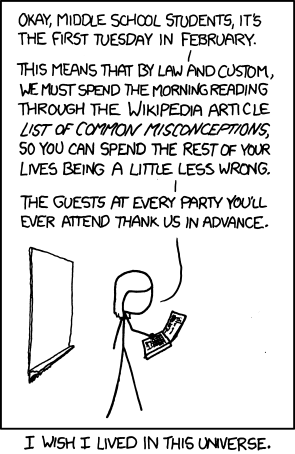Eight Glasses of Water and other Common Misconceptions

jenthestrawberry
Posts: 93 Member

You probably didn't actually have this class on the first day in February, and if you're like me don't really have the time to read the whole page right now! But here is the 'relevant' information on food, nutrition, and cooking for you!
* Eight glasses of water a day are not necessary to maintain health. Consuming things that contain water such as juice, tea, milk, fruits and vegetables also keeps a person hydrated.
* Sugar does not cause hyperactivity in children. Double-blind trials have shown no difference in behavior between children given sugar-full or sugar-free diets, even in studies specifically looking at children with attention-deficit/hyperactivity disorder or those considered sensitive to sugar. The difference in behaviour proved to be psychological.
* Alcohol does not make one warmer. The reason that alcoholic drinks create the sensation of warmth is that they cause blood vessels to dilate and stimulate nerve endings near the surface of the skin with an influx of warm blood. This can actually result in making the core body temperature lower, as it allows for easier heat exchange with a cold external environment.
* Alcohol does not kill brain cells. Early temperance writers promoted the idea that drinking causes brain cells to die (as well as the assertion that the alcohol in the blood stream could cause people to catch fire and burn alive). According to Queensland Brain Institute director Professor Perry Bartlett, there is no evidence that drinking alcohol leads directly to the death of brain cells. In fact, alcohol has positive health benefits when used moderately and new brain cells are generated on a daily basis. Alcohol can lead indirectly to the death of brain cells in chronic, heavy alcohol users whose brains have adapted to the effects of alcohol, where abrupt cessation following heavy use can cause excitotoxicity leading to cellular death in multiple areas of the brain.
* A vegetarian or vegan diet can provide enough protein. In fact, typical protein intakes of ovo-lacto vegetarians and of vegans meet and exceed requirements. While lower in protein than non-vegetarian diets, adequate but low protein diets have been shown to be beneficial against cancer. A non-vegetarian diet high in protein such as a typical diet in the United States in fact has been shown to be linked to several diseases including osteoporosis, cancer, impaired kidney function, and heart disease. However, a vegetarian or vegan diet is not a cure-all for all human disease, and a strict vegan diet does require supplementation of Vitamin B-12 for optimal health.
* Searing meat does not "seal in" moisture, and in fact may actually cause meat to lose moisture. Generally, the value in searing meat is that it creates a brown crust with a rich flavor via the Maillard reaction.
* Mussels that do not open when cooked may still be fully cooked and safe to eat.
* Some cooks believe that food items cooked with wine or liquor will be non-alcoholic, because alcohol's low boiling point causes it to evaporate quickly when heated. However, a study found that some of the alcohol remains: 25% after 1 hour of baking or simmering, and 10% after 2 hours.
* Sushi does not mean "raw fish", and not all sushi includes raw fish. The name sushi refers to the vinegared rice used in it. Sushi is made with sumeshi, rice which has been gently folded with rice vinegar, salt, and sugar dressing. The rice is traditionally topped by raw fish, cooked seafood, fish roe, egg, and/or vegetables such as cucumber, daikon radish, and avocado. The related Japanese term sashimi is closer in definition to "raw fish", but still not quite accurate: Sashimi can also refer to any uncooked meat or vegetable, and usually refers more to the dish's presentation than to its ingredients. The dish consisted of sushi rice and other fillings wrapped in seaweed is called makizushi, and includes both "long rolls" and "hand rolls".
* Microwave ovens do not cook food from the inside out. Microwave radiation penetrates food and causes direct heating only a short distance from the surface. This distance is called the skin depth. As an example, lean muscle tissue (meat) has a skin depth of only about 1 centimetre (0.39 in) at microwave oven frequencies
* Placing metal inside a microwave oven does not damage the oven's electronics. There are, however, other safety-related issues: electrical arcing may occur on pieces of metal not designed for use in a microwave oven, and metal objects may become hot enough to damage food, skin, or the interior of the microwave oven. Metallic objects that are designed for microwave use can be used in a microwave with no danger; examples include the metalized surfaces used in browning sleeves and pizza-cooking platforms.
* Swallowed chewing gum does not take seven years to digest. In fact, chewing gum is mostly indigestible, but passes through the digestive system at the same rate as other matter.
The food related misconceptions from the list of common misconceptions Wikipedia see full article for sources:
http://en.wikipedia.org/wiki/List_of_common_misconceptions
0
Replies
-
I understand that you "shouldn't believe everything you read" - however, Wikipedia is NOT and never should be used as a credible source. It is user-based, and does not warrant or require scientific or in-depth knowledge of a subject.
Don't get me wrong - its a great tool for a quick search and info, but it shouldn't be used as a reference.
**EDIT - that's not to say everything on it is incorrect. Just that you should take it with a grain of salt, and really do your research before making any health/nutrition decisions.0 -
bump0
-
I understand that you "shouldn't believe everything you read" - however, Wikipedia is NOT and never should be used as a credible source. It is user-based, and does not warrant or require scientific or in-depth knowledge of a subject.
Don't get me wrong - its a great tool for a quick search and info, but it shouldn't be used as a reference.
**EDIT - that's not to say everything on it is incorrect. Just that you should take it with a grain of salt, and really do your research before making any health/nutrition decisions.
Truthiness ^^ It wasn't enough of a citation for my lit papers, it's not enough to change what I eat.0 -
* Eight glasses of water a day are not necessary to maintain health. Consuming things that contain water such as juice, tea, milk, fruits and vegetables also keeps a person hydrated.
^^^^^^^ no ****! of course.... you can stay hydrated on fu**&^ing pepsi if you want.... though the added glucose syrup and sugar found in drinks (even fruit juices) is not "healthy"
you're better off NOT believing that0 -
And Metal did ruin our $700 microwave!! :sad:0
-
YAY!
Like the water one! I always think this as I tend to drink more tea at work or a diet coke at lunch time. My first post on here someone said I must be hungry still because I didn't drink enough water. I'd had loads of other liquids though so i wasn't dehydrated!0 -
Not meant as an attack on the OP... Thank you for sharing information that seems relevant to all of us.
I'm not here to just maintain health, I'm working on improving it. My water helps me do that by keeping me hydrated, doesn't add a bunch of calories to my diet, and gives me the feeling of fullness/satisfaction.
The statement regarding water may be true on some level, but when you really read it, it doesn't say much at all.0 -
The eight glasses of water thing is true. You should drink eight glasses of liquid, but it doesn' necessarily need to be water. When I tried the Cinch! diet, it said to count teas, juices, and such as water intake. I count my Fuze drinks, tea, and cofffee when I have them.0
-
I was actually told by my Dr that 8 glasses a day of water was not a requirement, unless you exercise regularly or do other activities that cause you to sweat. She just said to drink more water than anything else, and not to wait til thirsty to hydrate.0
-
So basically you're saying it's better to believe a lie, than to make educated decisions based on the truth?^^^^^^^ no ****! of course.... you can stay hydrated on fu**&^ing pepsi if you want.... though the added glucose syrup and sugar found in drinks (even fruit juices) is not "healthy"
you're better off NOT believing that
I'd rather know that Pepsi can keep me hydrated, but not drink it knowing it's full of sugar and not a healthy choice, than end up in an emergency situation believing a lie and not drinking/eating something because I don't know the facts. Facts combined with reasonable decisions are the most powerful change-makers in my life.I understand that you "shouldn't believe everything you read" - however, Wikipedia is NOT and never should be used as a credible source. It is user-based, and does not warrant or require scientific or in-depth knowledge of a subject.
Don't get me wrong - its a great tool for a quick search and info, but it shouldn't be used as a reference.
**EDIT - that's not to say everything on it is incorrect. Just that you should take it with a grain of salt, and really do your research before making any health/nutrition decisions.
Great Point! The thing that I love about wikipedia is that each comment has a source for it's information at the end of the paragraph. When I come across anything that challenges my belief system, I can see where the poster got their information and make the decision for myself.0 -
LMFAO.... emergency situations? like if you were stuck on a island with nothing but a 2 liter of pepsi?
common sence right their!0 -
* Eight glasses of water a day are not necessary to maintain health. Consuming things that contain water such as juice, tea, milk, fruits and vegetables also keeps a person hydrated.
^^^^^^^ no ****! of course.... you can stay hydrated on fu**&^ing pepsi if you want.... though the added glucose syrup and sugar found in drinks (even fruit juices) is not "healthy"
you're better off NOT believing that
Totally agree!! I used to rely on water from fruits and veggies and I chugged plain old unsweetened iced tea (brewed!!) by the gallon since clear beverages supposedly count as water. As I soon found out, that will only get you so far. In my case, I found out after a doctor's appointment that I was somewhat dehydrated. I was exercising a LOT and was shocked when I ran the #'s on how much water I should actually be drinking. I cut the iced tea and changed to plain old water...a lot of it...no problems since.
Most people actually run around a bit dehydrated which is why they gain water weight when they start a new "diet." Typically they are eating more fruits/vegetables and ....wait for it...drinking more water.
Then there is the whole "diet soda" issue....yes, they contain no calories, but they are destroying your perception of "sweet." But that is another post entirely.0 -
woooooooooo hoooooooooooooooooooo!! I'm loving that alcohol isnt killing my brain cells :bigsmile:
Anyone for a glass of wine? :drinker:
:laugh:0 -
I used to rely on water from fruits and veggies and I chugged plain old unsweetened iced tea (brewed!!) by the gallon since clear beverages supposedly count as water.
Yeah, I agree, drinking tea in place of water can be a problem! Well not tea, itself, but caffeine which is a natural diuretic and will dehydrate you. A friend of mine used to take those over-the-counter "Diuretic" pills, until they changed the labeling rules for caffeine and she found out that they had more caffeine than 3 cups of coffee!
*edit* typo0 -
* Alcohol does not kill brain cells. Early temperance writers promoted the idea that drinking causes brain cells to die (as well as the assertion that the alcohol in the blood stream could cause people to catch fire and burn alive). According to Queensland Brain Institute director Professor Perry Bartlett, there is no evidence that drinking alcohol leads directly to the death of brain cells. In fact, alcohol has positive health benefits when used moderately and new brain cells are generated on a daily basis. Alcohol can lead indirectly to the death of brain cells in chronic, heavy alcohol users whose brains have adapted to the effects of alcohol, where abrupt cessation following heavy use can cause excitotoxicity leading to cellular death in multiple areas of the brain.
A partial quote taken from http://www.penumbra.org.uk/how-can-we-help/services/alcohol-related-brain-damage-services
About ARBD (Alcohol Related Brain Damage)
"Long-term excessive alcohol consumption, coupled with a poor diet, and crucially the inability for the body to absorb thiamine (vitamin B1), leads to specific neurological and physical damage described under the umbrella term ARBD. Alcohol damages the gut and heavy drinkers tend to have a very poor diet, as a result sources of thiamine are scarce and the ability of the gut to absorb this important brain nutrient is impeded. Alcohol also has an effect on the central nervous system and produces changes in metabolic rate, heart functioning and blood supply. As we all know, alcohol causes dehydration, which over a long period of time can lead to shrinkage of the brain and wastage of brain cells. "
My personal experience is that I work along side health professionals that work in the field of Substance Misuse, both drug & alcohol, who have first hand experience of the devastating effects of alcohol related brain damage etc, admittedly due to being drunk in excess!0 -
I used to rely on water from fruits and veggies and I chugged plain old unsweetened iced tea (brewed!!) by the gallon since clear beverages supposedly count as water.
Yeah, I agree, drinking tea in place of water can be a problem! Well not tea, itself, but caffeine which is a natural diuretic and will dehydrate you. A friend of mine used to take those over-the-counter "Diuretic" pills, until they changed the labeling rules for caffeine and she found out that they had more caffeine than 3 cups of coffee!
*edit* typo
Actually, caffeine in tea dehydrating you needs to be added to the list of common misconceptions.
http://www.ncbi.nlm.nih.gov/pubmed/197747540 -
Great post.
 xkcd and wikipedia. 0
xkcd and wikipedia. 0 -
Actually, caffeine in tea dehydrating you needs to be added to the list of common misconceptions.
http://www.ncbi.nlm.nih.gov/pubmed/19774754
Interesting, I'll have to read more about this! It seems that it's only large-doses that aren't coupled with water that are actually linked to dehydration from a quick overview of your article and some recent medical studies on google scholar! Thanks!0 -
You do NOT need to drink 8 glasses of WATER. Liquid is all you need. This myth was put to bed years ago. Why are we still believing it?
Yes, liquids such as milk, juice, soda have calories. And diet drinks often have sodium. But you can get enough hydration without plain water. In fact you even get some hydration from food.
The 8 glasses is also a generalization. Some people need more, some need less.0 -
You do NOT need to drink 8 glasses of WATER. Liquid is all you need. This myth was put to bed years ago. Why are we still believing it?
Yes, liquids such as milk, juice, soda have calories. And diet drinks often have sodium. But you can get enough hydration without plain water. In fact you even get some hydration from food.
The 8 glasses is also a generalization. Some people need more, some need less.
Well said.0
This discussion has been closed.
Categories
- All Categories
- 1.4M Health, Wellness and Goals
- 398.2K Introduce Yourself
- 44.7K Getting Started
- 261K Health and Weight Loss
- 176.4K Food and Nutrition
- 47.7K Recipes
- 233K Fitness and Exercise
- 462 Sleep, Mindfulness and Overall Wellness
- 6.5K Goal: Maintaining Weight
- 8.7K Goal: Gaining Weight and Body Building
- 153.5K Motivation and Support
- 8.4K Challenges
- 1.4K Debate Club
- 96.5K Chit-Chat
- 2.6K Fun and Games
- 4.8K MyFitnessPal Information
- 12 News and Announcements
- 21 MyFitnessPal Academy
- 1.5K Feature Suggestions and Ideas
- 3.2K MyFitnessPal Tech Support Questions










